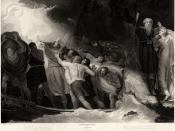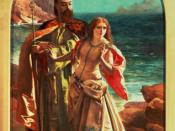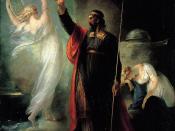In the play "The Tempest" written by Shakespeare, there are many different roles that Prospero plays. He has four major roles that I shall discuss as Duke of Milan, father to Miranda, master to Ariel and Caliban, and as a powerful magician.
Prospero was the Duke of Milan as he was usurped by his brother Antonio and exiled to an isolated island. He is quite a reluctant leader, "I thus neglecting worldly ends," and he is perhaps regretful of the way he approached past duties. His study of liberal arts began to get in the way of his duties as leader and Duke, "And Prospero, the prime duke, being so reputed, in dignity and for the liberal arts without a parallel."
Prospero is the father to Miranda. She is a pure and gentle individual because she has lived almost all of her life on this enchanted island. She is totally innocent and faultless and in addition has a sweet nature and a tender heart.
As she has been sealed off from the world for so long, Miranda's perceptions of other people tend to be naïve and non-judgemental, "I might call him a divine thing, for nothing natural, I ever saw so noble...make not too rash a trial for him, for he's gentle, and not fearful." She is especially loyal to her father and Prospero cares a great deal for his daughter. For example, when she meets Ferdinand and they arrange to get married, Prospero warns him about sex before marriage as it will bring bad luck, "Take my daughter, but if thou dost break her virgin-knot before holy rite be ministered, no sweet aspersion shall the heavens let fall ... but barren hate, sour-eyed disdain and discord shall bestrew the union of your bed." I believe that Prospero does care for Miranda and wants to see her happy.
Prospero is also a master; His punishments for Caliban are petty and vindictive. After Prospero befriended him and taught him how to speak and think, Caliban betrayed him and as a result, Prospero enslaved him to a life of low tasks; he refused to ever trust him again. Caliban hates his master and will do anything to be free.
Like Caliban, Prospero enslaved Ariel. Ariel helps his master in his performance of magic and carries out the orders that Prospero gives, "I will be correspondent to command and do my spiriting gently." Ariel is mischievous and carefree, able to cross the length of the island in an instant and change shapes when he feels like it, "If you could hurt, your swords are now too massy for your strengths, and will not be uplifted." Prospero is extremely learned, having studied most of his life. He has used his years of solitude on the island to study magical arts, which has enabled him to control and command the island and many spirits around him. Prospero appears almost God-like in his use of magic and the way he masterfully dominates what will happen from one moment to the next. When he calls forth the spirits to do his bidding and summons the goddesses to bless and celebrate the marriage of his daughter to Ferdinand are clear examples of the depth of his magical abilities. Fortunately, Prospero is a noble character that uses restraint in practising his powers. His various schemes, spells, and manipulations all work, as part of his grand design to achieve the play's happy ending.
Prospero emerges as a more likeable and sympathetic character in the final two acts. In these, his love for Miranda, forgiveness of his enemies, and the end of his scheme all come together to achieve a happy ending.
Throughout the play, Prospero proves that he is: a noble man, a loving father, a forgiving brother, a fair leader, and a powerful master. Even though his brother and his allies have stolen the kingdom from him, Prospero is able to forgive them. He could have easily killed or punished them but instead he forces them to see the error of their ways and pledge loyalty to him. As a result, when Prospero returns to Milan to be its ruler, he will be more honoured and powerful than ever; his subjects will not dare to plot against the restored Prospero in the future.


